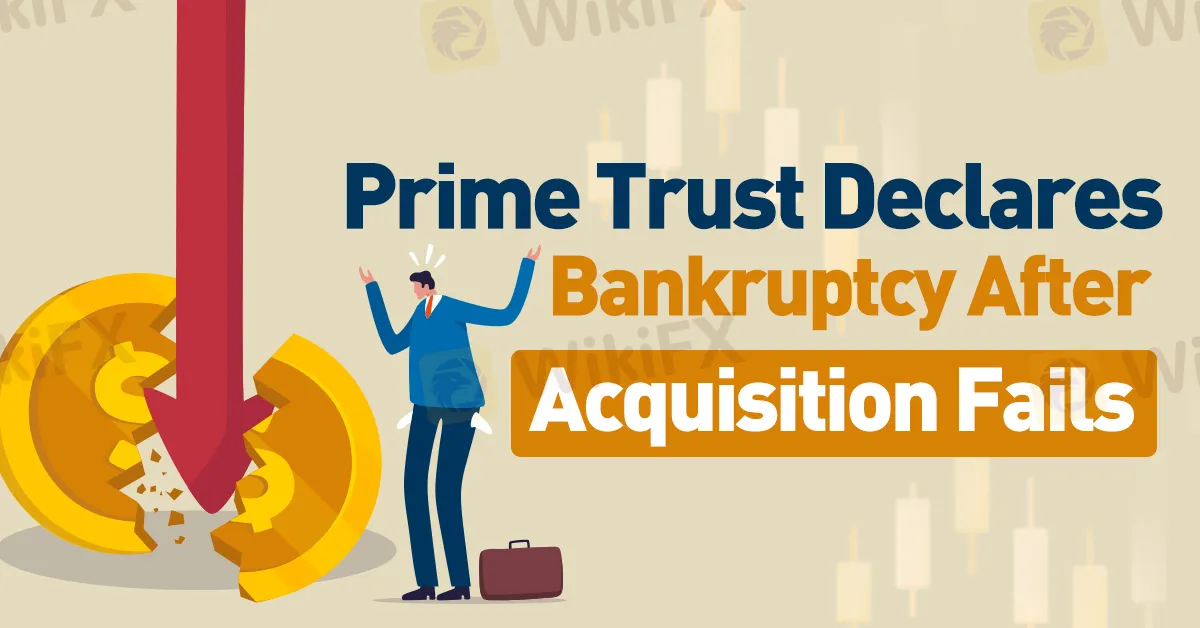简体中文
繁體中文
English
Pусский
日本語
ภาษาไทย
Tiếng Việt
Bahasa Indonesia
Español
हिन्दी
Filippiiniläinen
Français
Deutsch
Português
Türkçe
한국어
العربية
Prime Trust Declares Bankruptcy After Acquisition Fails
Abstract:Prime Trust, a Las Vegas-based cryptocurrency custodian, has taken the step of filing for Chapter 11 bankruptcy protection amidst a series of challenges including regulatory scrutiny and failed acquisition attempts.

Originally founded in 2016, Prime Trust initially garnered acclaim for its blockchain-based infrastructure and APIs tailored for financial institutions. Nonetheless, the company has recently initiated a Chapter 11 bankruptcy proceeding, marking the latest in a series of setbacks for the fintech enterprise, which has encountered a string of challenges over the past year, encompassing regulatory interventions and unsuccessful acquisition endeavours.
The decline of Prime Trust gathered momentum when it was placed under receivership by Nevada regulators in June, a move attributed to the company's insolvency and inability to cater to its clientele. Concurrently, a potential acquisition by its rival crypto custodian Bitgo fell through without elucidation, raising apprehensions about the firm's stability.

In June, Prime Trust's subsidiary Banq filed for bankruptcy due to alleged mismanagement during the tenure of former CEO Scott Purcell. In addition, partner company Abra confronted a cease and desist order in Texas following allegations of securities fraud.
The situation further deteriorated when the Nevada Financial Institutions Division (NFID) intervened, closing down Prime Trust's operations on the grounds of breaching fiduciary obligations and trust laws. Regulators reportedly uncovered instances where Prime Trust had inappropriately utilized customer funds to fulfil withdrawals since December 2021.
“The NFID was actively monitoring the solvency of Prime Trust in anticipation of a potential acquisition or merger,” stated the regulator. “Ultimately, Prime failed to safeguard assets under its custody and cannot meet all client withdrawals. As such, Prime had breached its fiduciary duties to its clients, violating Nevada trust laws.”
The alleged misallocation of funds was exacerbated by the majority of digital assets held by Prime Trust, predominantly composed of illiquid assets instead of more mainstream cryptocurrencies like Bitcoin. Consequently, the company faced escalating financial obligations.
Former President of the Bank of Nevada, John Guedry, has reportedly been appointed to lead the restructuring efforts as a receiver, while Judge Susan Johnson will oversee the bankruptcy proceedings. In the meantime, Prime Trust will continue its operations within the purview of the bankruptcy court. However, the company intends to file a motion to sustain the payment of wages and benefits to its employees during this phase.
Moreover, the cease and desist order prompted other cryptocurrency firms to withdraw their holdings from Prime Trust, generating a ripple effect within the industry. According to Tuesday's statement, Prime Trust is considering strategic alternatives, including the potential divestment of its assets.

Disclaimer:
The views in this article only represent the author's personal views, and do not constitute investment advice on this platform. This platform does not guarantee the accuracy, completeness and timeliness of the information in the article, and will not be liable for any loss caused by the use of or reliance on the information in the article.
Read more

Bybit Shuts Down NFT Marketplace Amid Crypto Market Downturn
Bybit announces the closure of its NFT marketplace, citing efforts to streamline offerings. Discover the latest trends in the declining NFT market and its shift to utility-based growth.

Galaxy Digital Settles $200M in Luna Token Manipulation Case
Galaxy Digital pays $200M to settle Luna token manipulation probe by NY regulators, linked to TerraUSD’s 2022 crash, impacting crypto market stability.

Vanuatu Passes VASP Act to Regulate Crypto and Digital Assets
Vanuatu's new VASP Act regulates crypto businesses, enforcing strict licensing, AML/CFT compliance, and investor protections.

Blockchain Decentralization: Empowering a Trustless Future
In recent years, blockchain technology has rapidly evolved from a niche innovation behind Bitcoin into a transformative force across industries. At its core, blockchain decentralization refers to the distribution of authority and decision-making away from a central entity and into the hands of a distributed network of participants. This shift redefines how data is stored and verified and paves the way for trustless, transparent, and resilient systems that challenge traditional centralized models.
WikiFX Broker
Latest News
The Withdrawal Trap: How Scam Brokers Lure Victims into Paying More
FCA to Investors: Think Twice Before Trusting These Brokers
Trump\s tariffs: How could they affect the UK and your money
Trump gambles it all on global tariffs he\s wanted for decades
TradingView Brings Live Market Charts to Telegram Users with New Mini App
Trump tariffs: How will India navigate a world on the brink of a trade war?
Interactive Brokers Launches Forecast Contracts in Canada for Market Predictions
Authorities Alert: MAS Impersonation Scam Hits Singapore
Stocks fall again as Trump tariff jitters continue
IG Group Acquires Freetrade for £160M to Expand UK Investment Market
Currency Calculator







